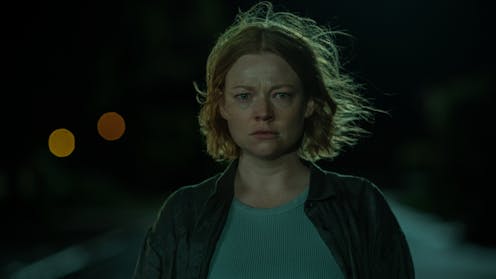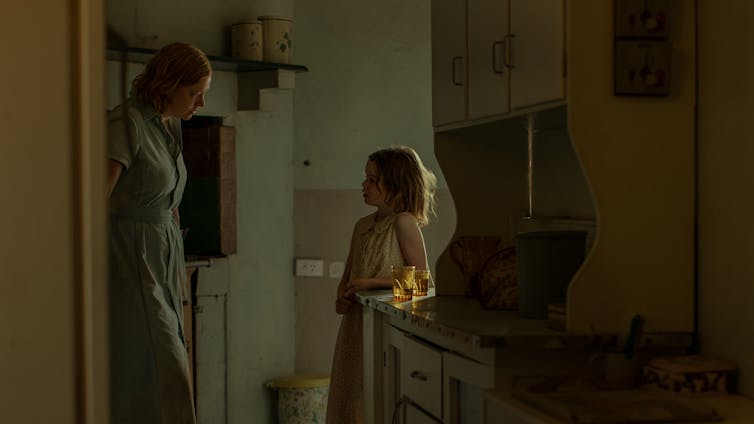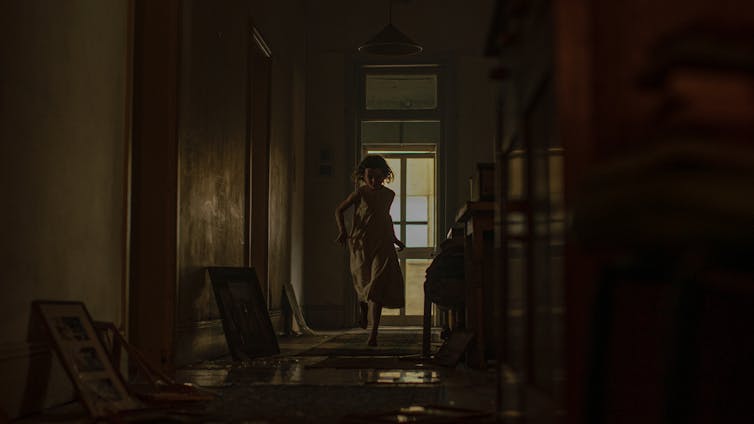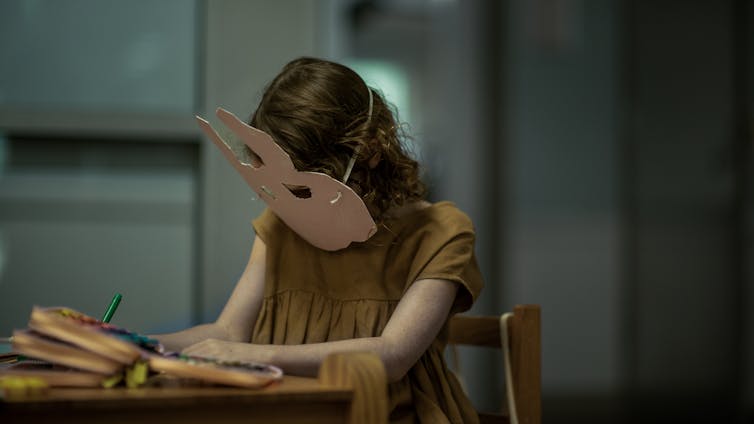Source: The Conversation (Au and NZ) – By Ari Mattes, Lecturer in Communications and Media, University of Notre Dame Australia

© Sarah Enticknap/Netflix
Dating back to the 1930s – earlier, even – horror cinema has been socially and politically conscious, interrogating taboos around gender, sex, class and race along with the borders between states like pro- and anti-social.
But it’s only been in the last 10 years or so that horror films – a booming genre following the success of Midsommar (2019) and Get Out (2017) – have started privileging telling rather than showing, didactically explaining themselves to the viewer as though we haven’t always already gotten it.
Horror films once managed to seamlessly integrate cultural commentary into their visceral effect. We could watch films like Wes Craven’s The Last House on the Left (1972) and be horrified yet intrigued by its critical commentary on American counterculture.
The most distinctive thing about the films of the current horror cycle is their lack of subtlety. It’s not enough that a film implies a kind of critical social position. A character now has to explicitly state this.
This kind of new sincerity has been sapping the genre of its fun.
Run Rabbit Run, following a mother and daughter as the past comes back to haunt them, is the latest Australian film to jump on the bandwagon of the new wave of horror.
The psychological terrain of the guilty mother is typical narrative fare, but, unlike Jennifer Kent’s brilliant The Babadook (2014), Run Rabbit Run doesn’t take any of this in surprising or invigorating directions.
The film fits into the kind of “self-help” horror mode, using the same cliches about trauma and psychology as self-help, presented in a neat package for the consumer.
Read more:
The rise of pop-psychology: can it make your life better, or is it all snake-oil?
No escape
Fertility doctor Sarah (Sarah Snook) and her young daughter Mia (Lily LaTorre) live alone.
When Mia begins showing an interest in her family’s secret history, the ghosts of the past – involving Sarah’s mysterious sister Alice (D’Arcy Carty) and mother, Joan (Greta Scacchi), now confined to some kind of institution (nursing home? asylum?) – begin to materialise in the present in classic gothic fashion.

© Sarah Enticknap/Netflix
The more the daughter reaches out to her mum in the hope of understanding her family, the more dysfunctional their relationship becomes. The scares become more frequent, and the whole thing culminates with a revelation so obvious (I had picked it at the 30-minute mark) one wonders if it was meant to be a revelation at all.
In trite fashion, the film’s closing moments show for Sarah, no matter how fast she runs, there’s no escaping her past.
Predictable cues and gothic cliches
This is TV director Daina Reid’s first feature film, so it makes sense it would be released by Netflix, whose films always feel more suited to the television than cinema screen.
Run Rabbit Run looks like a made-for-Netflix movie, with the usual lack of depth in the image and excessive sharpness that tend to define the films the company produces or distributes.
It follows some of the predictable visual cues of horror in the Instagram-era: muted, washed-out colours; a score favouring drone sounds; a plethora of slow-moving tracking shots and spooky silhouettes.

© Sarah Enticknap/Netflix
The narrative is replete with gothic cliches. Dream and reality start to mirror each other; there’s a weird kid; the ordinary and familiar become increasingly strange.
Run Rabbit Run very much functions as a kind of bourgeois horror film. We watch affluent people unable to cope with the realities of middle-class life, with the usual hangups.
It is most effective in its capacity to tap into some of the weirdness of being a parent, capturing the anarchic impulse of kids. This is the guiding theme of the film: the estrangement of the parent from the young child.
Your child, you inevitably discover, is not only not you, but also forever watching, critical, and in tension with you.
Read more:
Films made for Netflix look more like TV shows — here’s the technical reason why
A visceral medium
There’s nothing excessively bad about Run Rabbit Run. It’s a watchable psychological horror film with some genuinely arresting moments, but it suffers from the current earnestness running through so much contemporary popular culture.
It seems to approach its – let’s face it, totally ludicrous – ghost story with the seriousness of a Bergman film. The result is something that feels both lightweight and unpleasurable.
It uses silly cliches and caricatures from the tired annals of pop psychology, but the absolute seriousness of its tone saps these cliches of their potential to generate pleasure for the viewer (which, after all, is why we see genre films).

© Sarah Enticknap/Netflix
Film is a visceral medium; horror film more than most. The heavy-handed tone of Run Rabbit Run exhausts it of visceral impact. We are left with an object that simply does not move us very much.
Trauma from the past re-emerging in the present has always been an operative force underlying the Gothic, but in the best works it’s not literalised in the form of a petty individual trauma. It is integrated into the very substance of character and community, rather than reduced to the psychology of a single character.
The “trauma” in Run Rabbit Run – while significant for the characters – doesn’t connect to any more meaningful cultural or historical moment. With nothing left unsaid, any ambiguous complexity of character is absent.
The tendency of the new wave of horror is to have everything on the surface. In the social media age everything has become tell, tell, tell. I guess it’s no surprise horror films follow this path. Yawn.
Run Rabbit Run is on Netflix from today.
Read more:
Why true horror movies are about more than things going bump in the night
![]()
Ari Mattes does not work for, consult, own shares in or receive funding from any company or organisation that would benefit from this article, and has disclosed no relevant affiliations beyond their academic appointment.
– ref. Run Rabbit Run isn’t excessively bad – just earnest, heavy-handed and predictable – https://theconversation.com/run-rabbit-run-isnt-excessively-bad-just-earnest-heavy-handed-and-predictable-207626




